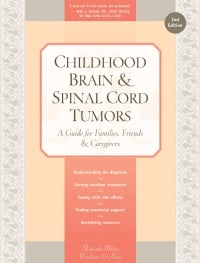Childhood Brain and Spinal Cord Tumors
Getting a second opinion
There are times during your child’s treatment when a second opinion may be advisable. Parents are sometimes reluctant to request a second opinion because they are afraid of offending their child’s doctor or creating antagonism. Conscientious doctors will not resent a parent seeking a second opinion. If your child’s doctor does resist, ask why. Second opinions are a common and accepted practice, and they are sometimes required by insurance companies.
There are two ways to get a second opinion: see another specialist or ask the child’s doctor to arrange a multidisciplinary second opinion. Many parents seek a second or third opinion at the time of diagnosis. Do not do this in secret. Explain to your child’s pediatric neurosurgeon or neuro-oncologist that, before proceeding, you would like additional viewpoints. To allow for a thorough analysis, arrange to have copies of all records, scans, and pathology slides sent ahead to the doctor(s) who will give the additional opinions. It is often helpful to get an opinion from a neuro-oncologist and one from a neurosurgeon.
Personally, I feel there is nothing wrong with getting a second opinion from another major center. If you like and feel comfortable with your current team, that’s great, but I definitely do not like when a doctor tells the patient there’s “no reason” to go elsewhere, “they can’t do anything we don’t do,” and so forth. Many people choose to go elsewhere and have great results when a first doctor may have told them “no surgery,” “it’s hopeless,” whatever the case may be. Many people travel great distances to get treatment at another facility whose treatment philosophy they prefer. And, granted, that is their choice. We chose to take our son to a top neurosurgeon about 3 hours away and, let me tell you, it has been the best thing that we have done for him. Now, your second opinion doctor may look at your child’s MRIs and say, “Your team is doing exactly the right things; stick with them,” or they may tell you something totally different and then you can make your own decision on what to do. It is always wise to get more than one opinion when dealing with something as serious as a brain tumor.
Multidisciplinary second opinions incorporate the views of several different specialists. Parents who would like to get various viewpoints can ask to have the child’s situation discussed at a tumor board, which usually meets weekly at major medical centers. These boards include medical, surgical, and radiation oncologists, as well as pathologists, radiologists, fellows, and residents. Your child’s pediatric neurosurgeon or neuro-oncologist will present the facts of your child’s case for discussion. Ask him to tell you what was said at the meeting.
Table of Contents
All Guides- Introduction
- 1. Diagnosis
- 2. The Brain and Spinal Cord
- 3. Types of Tumors
- 4. Telling Your Child and Others
- 5. Choosing a Treatment
- 6. Coping with Procedures
- 7. Forming a Partnership with the Treatment Team
- 8. Hospitalization
- 9. Venous Catheters
- 10. Surgery
- 11. Chemotherapy
- 12. Common Side Effects of Chemotherapy
- 13. Radiation Therapy
- 14. Peripheral Blood Stem Cell Transplantation
- 15. Siblings
- 16. Family and Friends
- 17. Communication and Behavior
- 18. School
- 19. Sources of Support
- 20. Nutrition
- 21. Medical and Financial Record-keeping
- 22. End of Treatment and Beyond
- 23. Recurrence
- 24. Death and Bereavement
- 25. Looking Forward
- Appendix A. Blood Tests and What They Mean
- Appendix C. Books and Websites

